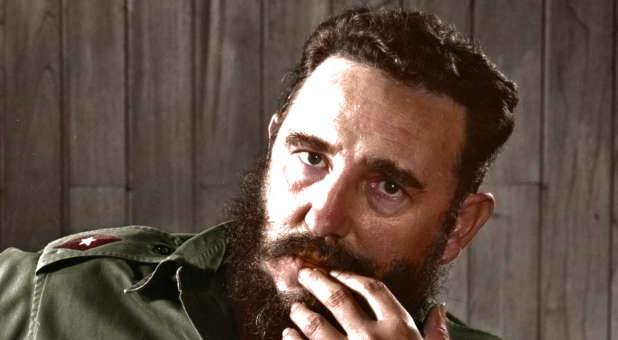Castro Couldn’t Kill Christianity in Cuba
After Fidel Castro’s death on Nov. 25, journalists, Hollywood entertainers and heads of state described the Cuban leader as an “iconic figure,” a “tireless advocate for equity” and “a champion of the poor.”
Never was it so obvious that the world has gone crazy than this past weekend, when world leaders applauded a dictator who tortured his own people.
Canada’s prime minister, Justin Trudeau, called Castro a “remarkable leader.” Vladimir Putin of Russia called him “a strong and wise man.” Ban Ki-moon, secretary general of the United Nations, described Castro as “a strong voice for social justice.”
These eulogies remind me of a warning from the prophet Isaiah, who wrote: “Woe to those who call evil good, and good evil” (Is. 5:20a).
I appreciate Florida senator Marco Rubio’s more honest assessment of Castro. A Cuban-American himself, Rubio said on the day after Castro’s death: “One thing is clear: history will not absolve Fidel Castro; it will remember him as an evil, murderous dictator who inflicted misery and suffering on his own people.”
I know it’s tempting—in a politically correct sort of way—to say nice things about tyrants at their funerals. But it is a mockery of justice to applaud a man like Fidel Castro when his record of human rights abuses is so criminal. Regardless of where you stand politically, this man was evil personified. Consider his legacy of shame:
- He ordered mass executions of government officials when he took control of Cuba in 1959, and he was responsible for so many executions and “disappearances” of citizens that no one has been able to calculate the number;
- He imprisoned, tortured and murdered more of his own people than any other Latin American dictator;
- He forced more than 20 percent of Cuban citizens to flee the island, and some of them died in their boats while trying to escape;
- He created a police state in which citizens were subjected to 24-hour surveillance;
- He punished artists, writers and journalists for thinking freely, and he built concentration camps for dissidents—including thousands of gays and lesbians;
- He closed down all private enterprise, ended private ownership of all property and eventually destroyed Cuba’s economy;
- He mentored Venezuela’s dictator, Hugo Chavez, who then turned Venezuela into a sad copy of Cuba. Today, that nation is on the brink of total ruin while its people stand in line for hours to buy bread;
- He attacked churches, executed and tortured pastors and attempted to wipe out Christianity to create his socialist utopia. His motto was “Socialismo o muerte,” “Socialism or death.”
What is worse, and even creepy, about Castro is that he was an avowed atheist who was reportedly involved in santaria and other forms of Afro-Caribbean witchcraft. Ever since a white dove landed on Castro’s shoulder during a speech in 1959, sanitaria followers have believed he enjoyed supernatural protection from assassination attempts.
What was Castro’s legacy? I would suggest the inscription on his tombstone should say: “He Couldn’t Stop Christianity.”
I visited Cuba in 1993, just after Castro began slightly softening his cruel restrictions on religion. I met many pastors who had been arrested and sentenced to years in prison camps because of their Christian faith. They knew what it means to face the spirit of antichrist. Yet after they were released, they found that Castro was unable to stop the spread of the gospel—even though he threatened churches with demolition and prevented the building of others.
I’ll never forget the night a Pentecostal pastor told me we were going to visit what he called a “house church” on the western edge of Havana. I imagined I would be worshipping with a small group huddled in a basement. But when we arrived at the house, more than 200 people were joyfully singing praise choruses in the front yard.
When I asked the pastor if he was worried the police might arrest somebody, he smiled and calmly said: “Don’t worry. Everybody in this neighborhood comes to this church.”
In spite of Castro’s hatred of God, his thirst for blood and his iron-fisted control, he could not stop the truth of Jesus from spreading in Cuba. A recent report by CBN News says 16,000 new churches have opened in Cuba in the past two decades. Missionary work on the island is at an all-time high.
Evangelist Luis Palau’s organization sponsored the largest pastor training event in Cuban history this month, and those who were involved say Cuba is witnessing a miraculous awakening.
Carlos Barbieri, director of the Luis Palau Bible Institute, said: “The church in Cuba has grown in the shadows of culture for many years. Many of the churches and church leaders were born in the trenches and underground. They are bold and persistent. They are undoubtedly a living example for others, committed to the Scriptures and passionate about the Lord.”
Fidel Castro worked for decades to snuff out faith on his island. But now he is dead—and the Cuban church has not just survived, it has thrived. Castro’s sad life provides a warning to all leaders bent on evil. And Cuba’s dark night has finally ended.{eoa}







































